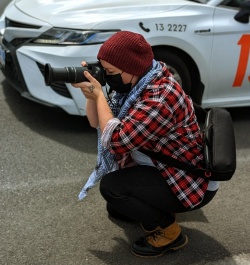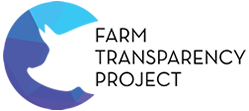News & Media > Editorials > The Resistance of Animals
The Resistance of Animals
On Friday 13 (November) 2020, Farm Transparency Project published a short video, a mere snippet of the footage obtained from the recently exposed Kankool Pet Food slaughterhouse, showing a cow taking the opportunity to push past a horse in the unloading ramp, and then make a desperate dash for freedom. She ran for her life, perhaps sensing the violence steeped into the very walls of that place, only to find a fence obstructing her path to freedom. A Mick Taylor-esque figure is seen following her, clutching a rifle in his hand; one shot and she was dead. Not long after she became mere food for equally exploited greyhounds.
She tried to escape, but her freedom was cruelly taken from her.
Nevertheless, her attempt to flee an inevitable death show that animals are capable of being the agents of their own resistance against the violence and exploitation we humans inflict upon them. They are capable of knowing they are in a situation of danger. They are capable of seizing an opportunity that arises. In some situations they even show themselves to be capable of engaging in acts of proactive resistance against those they perceive to be doing them harm.
In 2020, a pod of orcas in the waters off the coast of Spain began engaging in attacks on yachts and fishing vessels, damaging and disabling some vessels and even injuring people on board. There has been much supposition as to the cause of these attacks; some have surmised the orcas associate the boats with food, or with the ever decreasing supply of their own food source. One marine biologist noted there had been a number of orca calves from the pod killed by long lines and fishing nets. Whatever the motivation, these orcas do not want boats in their territories and are engaging in what has felt like orchestrated attacks upon the vessels and those who sail them.
They are agents of resistance, whether we understand their motivations or not. So too is the cow from Kankool a freedom fighter in her own right.
But what happens after the act of resistance is undertaken is, unfortunately, entirely up to humans.
Kankool Pet Foods chose to send someone out to kill the cow who dared try to escape, despite her clear expression of refusal. She wanted to live; they wanted her to die. Her agency was of no concern in the face of profits, and the need to sell her flesh to an industry that feeds cows and horses to the dogs they force to run for their very lives.
At this time Spanish maritime authorities have chosen to warn vessels of the orca pods rather than exterminate them. But how long their aggression will be tolerated by humans remains to be seen; the killing may yet begin.
Because the sad truth is that no matter the lengths other animals go to in pursuit of their own liberty, it will always be a human who decides whether they can live their days in a sanctuary, or in their natural habitat, or whether they will be killed. As advocates for the liberation of other animals it is imperative that we position ourselves not as the saviours of animals, but rather as co-liberators facilitating the liberation of other animals, a process that they often commence themselves. And we must honour those who tried to escape the slaughterman's knife as heroes in their own right, as freedom fighters, and as autonomous beings with whom we stand in solidarity.
RIP to the cow from Kankool. We saw you. And we will remember your fight.



